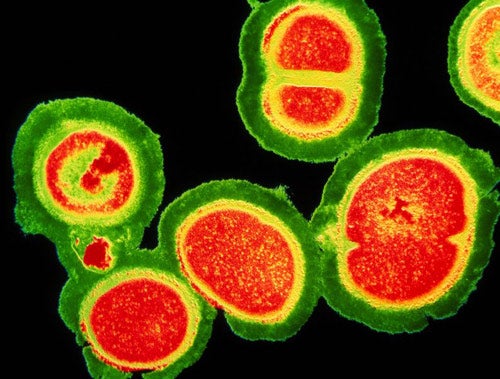MRSA-infected medics allowed to keep working

Your support helps us to tell the story
From reproductive rights to climate change to Big Tech, The Independent is on the ground when the story is developing. Whether it's investigating the financials of Elon Musk's pro-Trump PAC or producing our latest documentary, 'The A Word', which shines a light on the American women fighting for reproductive rights, we know how important it is to parse out the facts from the messaging.
At such a critical moment in US history, we need reporters on the ground. Your donation allows us to keep sending journalists to speak to both sides of the story.
The Independent is trusted by Americans across the entire political spectrum. And unlike many other quality news outlets, we choose not to lock Americans out of our reporting and analysis with paywalls. We believe quality journalism should be available to everyone, paid for by those who can afford it.
Your support makes all the difference.Hospital trusts are allowing doctors and nurses to continue treating patients even after testing positive for potentially lethal superbugs including MRSA.
Hundreds of trusts do not take their staff off wards automatically if they are found to be carrying one of the most virulent hospital bugs, methicillin-resistant Staphylococcus aureus (MRSA), which can be spread by human contact.
A survey of trusts carried out by The Independent on Sunday revealed that few routinely screen staff for the infection, or even keep records of the number of employees infected with MRSA. They claimed such a policy was fully in line with government guidelines. The approach is backed by many unions – including one that warned that a hardline policy could damage its members' financial well-being and career prospects.
But the British approach to medical professionals with MRSA contrasts sharply with that in the Netherlands, where hospital staff are regularly screened and sent home if they test positive. The Dutch have one of the lowest MRSA rates in Europe.
Medical experts and patients' pressure groups last night condemned the "relaxed" attitude to the risks posed by doctors and nurses arriving for work on NHS wards every day.
Derek Butler, the chairman of MRSA Action UK, said the Government had to impose tighter rules on staff if it was to "get serious" about tackling an infection that contributes to more than 1,600 deaths every year.
"This is one of the hidden problems of MRSA," said Mr Butler. "We are talking about people who come in from the outside every day and could well be bringing this infection in with them.
"Staff should be screened regularly and if they are colonised with this infection they should be taken off duty until they are clear. Given that it is commonly carried in the nose, people who are carrying it should at least be required to wear a mask to prevent it being transmitted to patients."
Government guidelines on MRSA state that "screening of staff is not recommended routinely, but if new MRSA carriers are found among the patients on a ward, staff should be asked about skin lesions".
The advice continues: "In principle, only staff members with colonised or infected hand lesions should be off work while receiving courses of clearance therapy."
Professor Mark Enright, a microbiologist at Imperial College London, said the fact that some 30 per cent of the population carried MRSA could mean a tougher testing regime would damage the careers of health staff by banning persistent carriers from areas of risk, including operating theatres.
The Royal College of Nursing guidance on MRSA claims that forcing infected staff to stay away from work until they are clear "will lead to staff shortages and can affect the employment prospects, career opportunities and income of these staff".
But Professor Enright said: "There is an argument for tighter rules on staff. The impact it could have on careers is a big problem, but if the Government is serious about dealing with this, it may have to consider all options."
Paul Weaving, nurse consultant on infection prevention and control at the University Hospitals of Morecambe Bay NHS Trust, said staff screening was normally carried out only when there was an unusually high incidence of MRSA on a ward. "In practice, staff found to be colonised with MRSA will be offered treatment but will continue to work. This is because MRSA is transmitted almost entirely by touch, and the standard infection control precautions that should be practised by all staff with all patients will be sufficient to prevent transmission."
In contrast, Great Ormond Street Hospital in London, one of the 20 best trusts at controlling MRSA cross-infection, excludes staff found to be carrying MRSA from work until they have had three negative tests at 48-hour intervals.
A spokesperson for the Department of Health said: "It is important that staff who contract MRSA are properly dealt with, both for their own and for their patients' benefit.
"Staff with known active infection with Staphylococcus aureus should not be engaged in direct clinical work until their lesions are healed."
The growing threat
17
strains of MRSA detected by experts, all showing varying degrees of drug resistance
51
Death certificates mentioned MRSA in 1993
1,652
Death certificates mentioned MRSA in 2006
96,000
hospital patients carrying the infection in 2004, as estimated in research carried out for the Conservative Party
20-40%
of the population carry MRSA, mostly in the nose or on the skin – a total of up to 24 million people
£57.5m
in funding ploughed into a "deep clean" of hospitals, announced by Gordon Brown. The exercise was condemned because many health trusts missed the deadline set for it, and because it didn't tackle the issue of people bringing the bug into hospitals in the first place
£1bn
being spent every year by the NHS on the battle against the superbug
Join our commenting forum
Join thought-provoking conversations, follow other Independent readers and see their replies
Comments